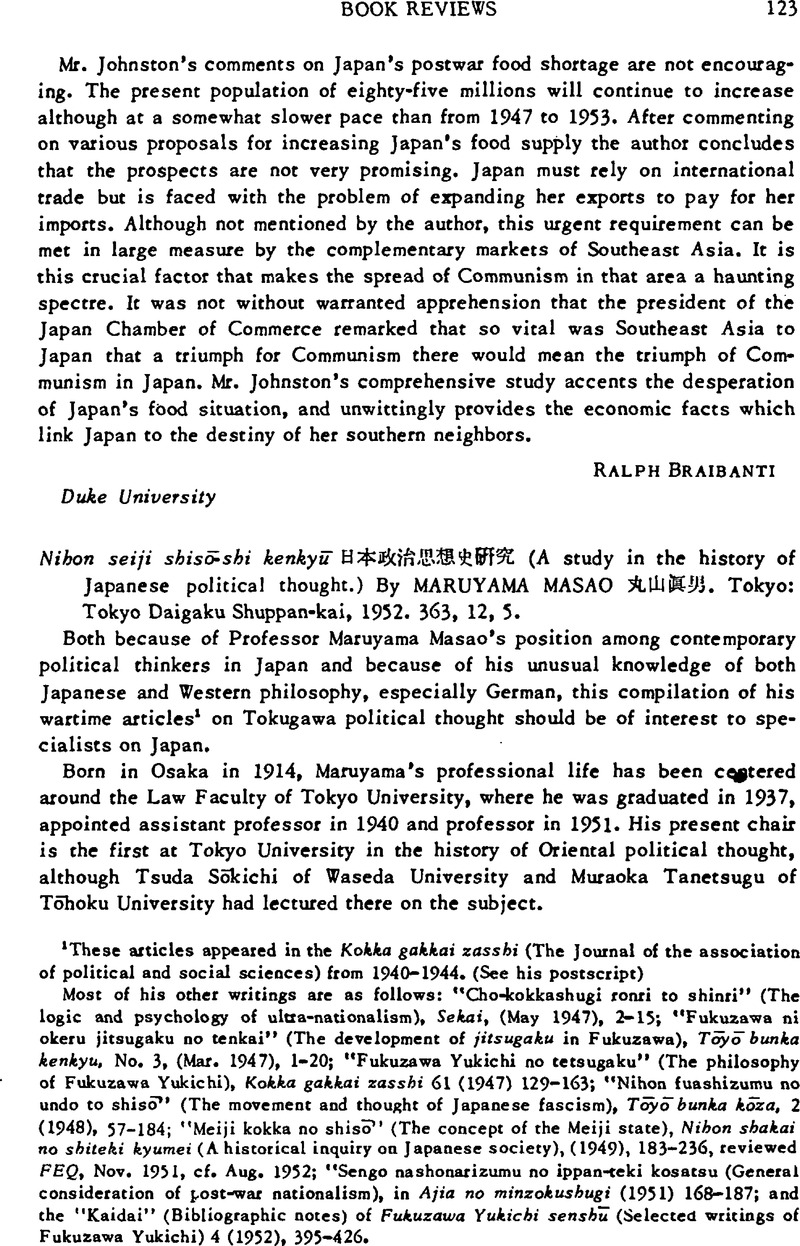No CrossRef data available.
Article contents
Nihon seiji shisō-shi kenkyū (A study in the history of Japanese political thought.) By Maruyama Masao . Tokyo: Tokyo Daigaku Shuppan-kai, 1952. 363, 12, 5.
Published online by Cambridge University Press: 23 March 2011
Abstract

- Type
- Book Reviews
- Information
- Copyright
- Copyright © The Association for Asian Studies, Inc. 1954
References
1 These articles appeared in the Kokka gakkai zasshi (The Journal of the association of political and social sciences) from 1940–1944. (See his postscript)
Most of his other writings are as follows: “Cho-kokkashugi ronri to shinri” (The logic and psychology of ultra-nationalism), Sekai, (05 1947), 2–15Google Scholar; “Fukuzawa ni okeru jitsugaku no tenkai” (The development of jitsugaku in Fukuzawa), Tōyō bunka kenkyu, No. 3, (03 1947), 1–20Google Scholar; “Fukuzawa Yukichi no tetsugaku” (The philosophy of Fukuzawa Yukichi), Kokka gakkai zasshi 61 (1947) 129–163Google Scholar; “Nihon fuashizumu no undo to shisō” (The movement and thought of Japanese fascism), Tōyō bunka kōza, 2 (1948), 571–184Google Scholar; “Meiji kokka no shisō” (The concept of the Meiji state), Nihon shakai no shiteki kyumei (A historical inquiry on Japanese society), (1949), 183Google Scholar, reviewed FEQ, 11 1951, cf. 08 1952Google Scholar; “Sengo nashonarizumu no ippan-teki kosatsu (General consideration of post-war nationalism), in Ajia no minzokushugi (1951) 168–187Google Scholar; and the “Kaidai” (Bibliographic notes) of Fukuzawa Yukichi senshū (Selected writings of Fukuzawa Yukichi) 4 (1952), 395–426.Google Scholar
2 The German version came out in 1929, but it can be found in English as Pans II–IV of Kail Mannheim's, Ideology and Utopia (tr. Louis Wirth, 1949).Google Scholar
3 In his Philosophy of history (tr. Sibree, 1944)Google Scholar, Hegel mentions Confucius only in passing. He says of Confucius' works: “…‥ there is a circumlocution, a reflex character, and circuitousness in the thought (which prevents it from rising above mediocrity).” (p. 136)Google Scholar
4 Maruyama is aware of the difference between European and Tokugawa feudalism and also the different usages of “feudal” by Marxists and in Weber's typology. Here vis-a-vis Sorai, he means by “feudal” simply Sorai's support of Shogunal absolutism and therefore the system involved.
5 For instance see his reasons for omitting the Ming philosophy as expounded in Japan as Yōmeigaku (p. 32, note 8). Also his emphasis on Sorai.




